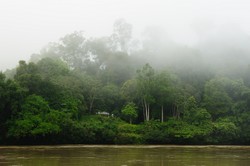Effect of water vapour flux on ecosystems
The ECOWAX(opens in new window) (Evaluating the variability of ecosystem water vapour fluxes and spatiotemporal effects of extreme events) project has addressed the question of variability in water fluxes to gain a clearer understanding of ecosystem water cycling. It investigated how ecosystem water vapour fluxes change in time and space. Researchers also studied how these fluxes vary among climates and different biomes, which are biological communities characterised by the dominant form of plant life. In addition, scientists investigated the effects of extreme events, such as drought, on these fluxes. The project combined in situ measurements of water vapour fluxes from the global network FLUXNET with the biophysical process model BESS (Breathing Earth System Simulator). Results showed that the seasonal timing of drought plays a major role for the impact on ecosystem water and carbon fluxes. Drought effects were found to differ during spring and summer and among ecosystem types, such as grasslands and forests. While forests increase their water use efficiency during spring drought, grasslands do not. Scientists also compiled and analysed a large-scale synthesis dataset to quantify the impact on ecosystem carbon and water fluxes of the exceptional continent wide drought of 2012 in the US. The drought resulted in widespread reductions in summer carbon uptake and water vapour fluxes. However, increased carbon uptake during the warmer spring compensated for the reductions in summer carbon uptake and reduced the impact on the annual carbon budget. The warmer spring also depleted water resources earlier and contributed to a positive heating feedback during the summer months, which could increase the intensity of heat waves. Tropical ecosystems were found to play the most important role in the global hydrological cycle. This is because they have the highest absolute rates of water vapour transport to the atmosphere and convert the largest proportion of available energy to latent heat. ECOWAX will increase the understanding of ecosystem water cycling, especially during extreme events such as large-scale drought. This information will help to develop mitigation strategies to secure water supply for human needs in the face of a changing climate.







